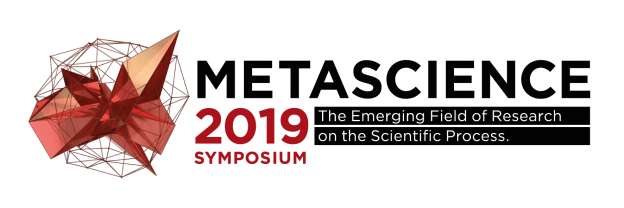On the back of the Nature Human Behaviour article on psychology’s Problem in Theory, I was invited as a Special Guest to the Metascience 2019 Symposium at Stanford University, CA. The meeting was designed as formative meeting for metascience as a discipline. One of the most interesting and thought-provoking conferences to which I’ve been. I tweeted some highlights and a few of my thoughts in relation to the problem in theory:
See more by searching Twitter for #metascience2019
More details from the conference website:
INVITED SPEAKERS
Carl Bergstrom (University of Washington, Seattle, USA), Dorothy Bishop (University of Oxford, UK), Annette N. Brown (Family Health International 360, Durham, USA), Tim Errington (Center for Open Science, Charlottesville, USA), James Evans (University of Chicago, USA), Daniele Fanelli (London School of Economics and Political Science, UK), Fiona Fidler (University of Melbourne, AU), Jacob Foster (University of California, Los Angeles, USA), Andrew Gelman (Columbia University, New York, USA), Steven Goodman (Stanford University, USA), Daniel Kahneman (Princeton University, USA), Zoltán Kekecs (Eötvös Loránd University, Budapest, HU), Carole Lee (University of Washington, Seattle, USA), Edward Miguel (University of California, Berkeley, USA), Staša Milojević (Indiana University, Bloomington, USA), Michèle Nuijten (Tilburg University, NL), Cailin O’Connor (University of California, Irvine, USA), Adam Russell (Defense Advanced Research Projects Agency, Arlington, USA), Marta Sales-Pardo (Universitat Rovira i Virgili, Tarragona, ES), Melissa Schilling (New York University, USA), Jonathan Schooler (University of California, Santa Barbara, USA), Dean Keith Simonton (University of California, Davis, USA), Roberta Sinatra (IT University of Copenhagen, DK), Paula Stephan (Georgia State University, Atlanta, USA), Simine Vazire (University of California, Davis, USA), Bernhard Voekl (University of Bern, CH), Jan Walleczek (Phenoscience Laboratories, Berlin, DE), Shirley Wang (Harvard Medical School, Boston, USA), Jevin West (University of Washington, USA), Yang Yang (Northwestern University, Evanston, USA)
PANEL DISCUSSANTS
Christie Aschwanden (Emergent Form, USA), Lisa Feldman Barrett (Northeastern University, Boston, USA), Richard Harris (National Public Radio, Washington, USA), Chonnettia Jones (Wellcome Trust, London, UK), Stephanie Lee (BuzzFeed News, New York, USA), Arthur Lupia (National Science Foundation, Alexandria, USA), Ivan Oransky (Retraction Watch, New York, USA), Dawid Potgieter (Templeton World Charity Foundation. Nassau, BS), Norbert Schwarz (University of Southern California, Los Angeles, USA), Kathleen Vohs (University of Minnesota, Minneapolis, USA), Jonathan Yewdell (National Institute of Allergy and Infectious Diseases, Bethesda, USA)
SYMPOSIUM ORGANIZERS
Brian Nosek (Center for Open Science, USA), Jonathan Schooler (UC Santa Barbara, USA), Jon Krosnick (Stanford Univ., USA), Leif Nelson (UC Berkeley, USA), Jan Walleczek (Phenoscience Laboratories, DE)
SCIENTIFIC ADVISORY BOARD
Deborah Mayo (Virginia Tech, USA), Helen Longino (Stanford Univ., USA), Donald Hoffman (UC Irvine, USA), Rebecca Saxe (MIT, USA), Colin Camerer (Caltech, USA), Steven Goodman (Stanford Univ., USA), Stephen Fiore (Univ. Central Florida, USA), Richard Harris (NPR, USA), John Protzko (UC Santa Barbara, USA)
OBJECTIVES
During this decade, we have witnessed the emergence of a new discipline called metascience, metaresearch, or the science of science. Most exciting was the fact that this is emerging as a truly interdisciplinary enterprise with contributors from every domain of research. This symposium served as a formative meeting for metascience as a discipline. The meeting have brought together leading scholars that are investigating questions related to themes such as:
- How do scientists generate ideas?
- How are our statistics, methods, and measurement practices affecting our capacity to identify robust findings?
- Does the distinction between exploratory and confirmatory research matter?
- What is replication and its impact and its value?
- How do scientists interpret and treat evidence?
- What are the cultures and norms of science?








